英美概况第三讲
- 格式:ppt
- 大小:838.50 KB
- 文档页数:2

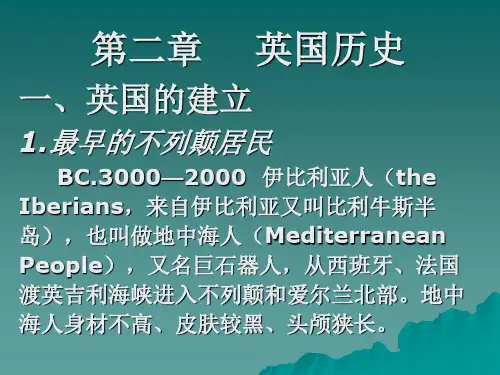

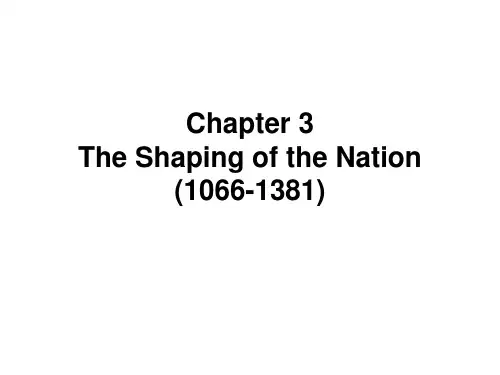

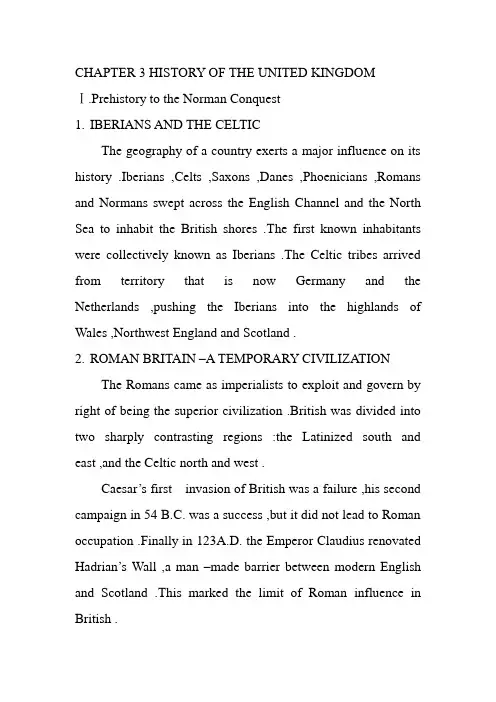
CHAPTER 3 HISTORY OF THE UNITED KINGDOMⅠ.Prehistory to the Norman Conquest1.IBERIANS AND THE CELTICThe geography of a country exerts a major influence on its history .Iberians ,Celts ,Saxons ,Danes ,Phoenicians ,Romans and Normans swept across the English Channel and the North Sea to inhabit the British shores .The first known inhabitants were collectively known as Iberians .The Celtic tribes arrived from territory that is now Germany and the Netherlands ,pushing the Iberians into the highlands of Wales ,Northwest England and Scotland .2.ROMAN BRITAIN –A TEMPORARY CIVILIZATIONThe Romans came as imperialists to exploit and govern by right of being the superior civilization .British was divided into two sharply contrasting regions :the Latinized south and east ,and the Celtic north and west .Caesar’s first invasion of British was a failure ,his second campaign in 54 B.C. was a success ,but it did not lead to Roman occupation .Finally in 123A.D. the Emperor Claudius renovated Hadrian’s Wall ,a man –made barrier between modern English and Scotland .This marked the limit of Roman influence in British .Roman civilization was based on city life in hundreds of walled towns liked by military roads . Bath ,a city where the Romans constructed large hot water bathing facilities ,became the center of fashion ,luxury and leisure .The government of Roman British was decentralized ,and larger towns had self-government .Rome became more Christianized ,the Romans brought Christian teachings to Britain .However ,the Romans failed to impose their culture as too few Romans were willing to colonize Britain .3.NORDIC INV ASIONS AND THE ANGLO-SAXONCONQUESTThe Germanic peoples loosely described as Anglo-Saxon ,came from what is now Scandinavia as well as from Germany .The Anglo-Saxons pushed the Celts into the mountains or overseas to Ireland ,Gaelic ,a term loosely used to describe the languages of modern Ireland and Scotland ,is derived from the early Celtic language .。

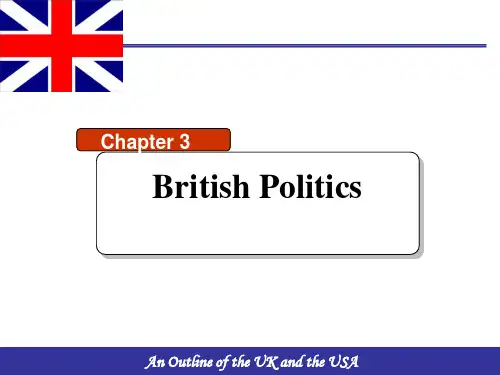

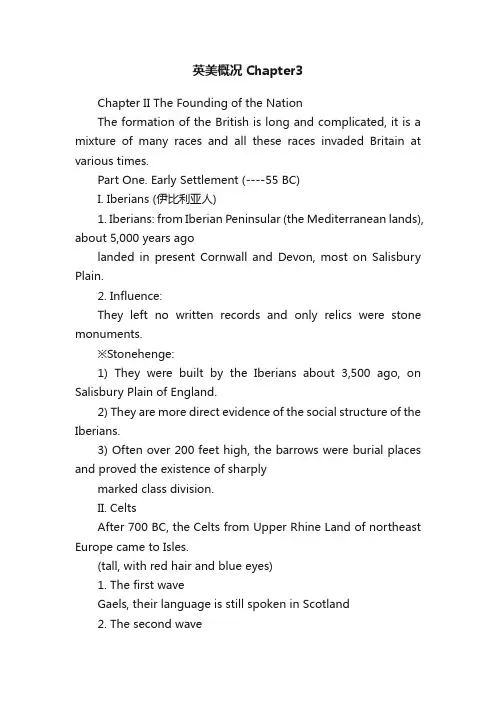
英美概况Chapter3Chapter II The Founding of the NationThe formation of the British is long and complicated, it is a mixture of many races and all these races invaded Britain at various times.Part One. Early Settlement (----55 BC)I. Iberians (伊比利亚人)1. Iberians: from Iberian Peninsular (the Mediterranean lands), about 5,000 years agolanded in present Cornwall and Devon, most on Salisbury Plain.2. Influence:They left no written records and only relics were stone monuments.※Stonehenge:1) They were built by the Iberians about 3,500 ago, on Salisbury Plain of England.2) They are more direct evidence of the social structure of the Iberians.3) Often over 200 feet high, the barrows were burial places and proved the existence of sharplymarked class division.II. CeltsAfter 700 BC, the Celts from Upper Rhine Land of northeast Europe came to Isles.(tall, with red hair and blue eyes)1. The first waveGaels, their language is still spoken in Scotland2. The second waveBrythons, came the English name for Britain3. The third waveBelgae from Northern Gaul, occupied the greater part of the Home CountiesPart Two: Roman Britain (55 BC---410)British recorded history begins with the Roman invasion.(Because Julius Caesar kept a diary and wrote down what he saw in England)I. Julius Caesar (55----54BC)This Roman commander in Gaul, came to Britain twice, but he had no attempt to conquer the island.II. The Emperor Claudius1. In 43 AD, Emperor Claudius invaded BritainThe territory south of the Humber and east of the Severn was annexed to Roman Empire. 2. The Romans invaded the Wales and Scotland.They conquered Wales, but never conquered Scotland.III. The Influence of Roman ConquerThe Roman occupation lasted nearly 400 years from AD 43—407, they brought the Roman civilization into England.1. Many baths, temples, amphitheatres, and fine buildings were set up.2. Many army bases are now important cities.These towns used names ending with “ster”, “cester”or “shire”---- Lancaster, Winchester and Yorkshire---- deriving from “castra”, the Latin word for camp.3. Roman roads were built all across Britain.Along the roads, towns grew up, they were like cities with urban life style and culture.Between the towns are villas. (the centers of agriculturalestates)In 5th century, the Roman government withdrew all their forces from Britain.Part Three: Anglo-Saxon Times1. After the Roman left, Germanic warriors landed in Britain.They included: Angles, Saxon and other JutesThey only occupied England, never possessed Scotland, Wales and Ireland.2. The Angles: East, the Midlands and the NorthThe Saxons: South and MidlandsThe Jutes: South and SoutheastEnglish, the language of the Angles, replaced the old Celtic languageThe country became known as England, “the land of the Angles”3. For 150 years, the Britons were destructed ruthlessly.Roman civilization remained little on the island.4. The Angles, Saxons and Jutes set up many kingdoms.At one time there were seven kingdoms called Heptarchy in history.Heptarchy: seven kingdoms established by the Angles, Saxons and JutesJutes---- Kent 肯特Angles----Northumbria (north) 诺森伯里亚Mercia (mid-land) 麦西亚East Anglia (east) 东安格利亚Saxon ---- Essex (east) 埃塞克斯Sussex (south) 苏塞克斯Wessex (west) 威塞克斯(Some legendary heroes tried to unite the kingdom, like KingArthur often in literature) 5. The Anglo-Saxon were organized into tribes governed by a chief or kingThey had a mixed economy of farming, hunting and animal husbandry.The social union was determined by the village.II. Augustine:He was the Prior of St. Andrew’s Monastery in Rome, and Pope Gregory sent him convert the English to Christianity in 597.He was received by King Ethelbert of Kent. Augustine was successful in converting the king and the nobility to Roman Christianity.He became the first Archbishop of Canterbury in 601. (the head of the Church)By the late 7th century, Roman Christianity became the dominant religion in Britain.III. The Influence of Anglo-Saxon Invasion1. Bring religion to the EnglandTiu, the God of War (Tuesday)Woden, Father of the Gods (Wednesday)Thor, God of Thunder (Thursday)Freya, Goddess of peace (Friday)2. Old English or Anglo-Saxon was formed.(Its vocabulary provided the basic of Modern English)Bede, a great historian, Ecclesiastical History of the English People is valuable.Beowulf, is considered the greatest Old English poem.3. Christianity spread throughout the land.Also Christianity began to flourish in literature.Part Four: The Danish InvasionI. Invasion of the DanesAround the turn of 8th century, the Danes or Vikings from the Scandinavian countries, invaded England.Some came from Norway, but most from Denmark.II. Alfred the GreatHe was the king of Wessex, and united the seven Anglo-Saxon kingdoms in England.1. King Alfred fought with Vikings1) He built boats, thus earning the name of “ the Father of the English Navy.”He reorganized the land army.2) Later King Alfred made a treaty with the Danish king .Let them keep the northern and eastern parts of England which known as the Danelaw.2. Contributions in peacetimeKing Alfred was even greater in peace than in war.1) He was a scholar and writer himselfHis service to literature was highly praised.His writing and translations have been called the beginning of prose literature in England.2) He codified laws and instituted the writing of the Anglo-Saxon Chronicle.3. Alfred died in 899 and buried in Winchester Cathedral.King Alfred was not only an able warrior but also a dedicated scholar and a wise ruler. He is known as “Alfred the Great”—the only monarch in English history to be given this title.III King EdwardFor next 130 years, the power of Britain shifted between the Anglo-Saxons and the Danes1. In 1042, Edward, the son of Ethelred, was put to the throne.(Since no capable man of the Danish line)Edward the Confessor was the penultimate king of England.He spent most of his time in Normandy.He built famous Westminster Abbey in 1052. (He was buried there)Since then, all of the nation’s coronation ceremonies have been held there.Part Five: The NormansI. King Harold1. In 1066, Edward Confessor died, and his brother-in-law, Harold of Wessex, was chosen as theking.2. The Duke William of Normandy claimed the place of the king.(Edward once made secret promise to have William succeed his position.)3. The Kings of Denmark and Norway would claim the king’s position.(Their family ties with Canute.)4. When Norway’s king occu pied the York, Harold defeated them.5. Hastings Battle:In 1066, Duke William landed on the Sussex coast, Harold rushed south to fight with them. Near Hastings, his men fought bravely, but they had no well equipment and were defeated, Harold was shot to death.II. William the Conqueror1. On Christmas Day 1066, William the Norman was crowned in Westminster Abbey.A new line of Norman king began to rule England.The Norman Conquest marked the establishment offeudalism in England.William was known as William the Conqueror in history.2. His Measures to develop the country:1) The feudal system based on the ownership of land① William took the land away from its English ownersRedistributed in the form of large estates to his Norman lords The King was able to centralize English society in his own person.2) Administration of justice under the control of the king① He had the sheriff rule over the county courts.② He replaced the English bishops with the NormansSet up the Church court to try cases according the laws of Rome.③He built the Tower of London and the Norman castles to watch over the English.3) The Domesday BookIt was the first survey of land and wealth in Britain under William to strengthen his rule. It aimed at getting taxes. (Now it is kept in the Public Records Office in London)In 1086, William sent out his officials to make a detailed record of all the wealth of England. Their work, the Domesday Book, provides a complete property description of the country.Content:It records all land and property, every mill and cottage, every cow and pig.It also records the rights and duties of every landowner and every court.Significance:It is valuable to later history because no other country did such a thorough compilation of facts about the Middle Ages.It was one of the important measures adopted by William I to establish the feudal system fully in England.III. The Consequences of Norman Conquest1. The Conquest was in effect a French conquest and the imposition upon England of a rulingFrench aristocracy.Norman-French replaced English as an authoritative language.(The conquest started a bilinguistic period in English history, French and English)So Middle English was strongly modified by an extensive infusion of French vocabulary. 2. It tied Engl and’s civilization closely to that of continental Europe.(French civilization) The Norman Conquest was one of the most decisive events in English history.It changed the way of the life of English people greatly.(Norman way of life)3. The Norman Conquest sped up the development of Feudalism and contributed to its finaland firm establishment in EnglandWilliam established a strong monarchy in England.It increased the process of feudalism which had begun during Anglo-Saxon times.The manor system had replaced the village system completely4. It brought changes in the church, the upper ranks clergy were Romanized and feudalized.The Norman Conquest was the last invasion of England by foreigners, but English history books do not treat the Norman Conquest as foreign aggression, rather it is treated as a hiddenblessing because of its positive effect.In fact, few English children are interested in the history prior to the Norman Conquest, and they hear of such historical figures as Alfred and King Arthur, but mostly as legendary heroes.This is partly reflected in the T ess of the Durbervilles, a novel by Hardy. Scott’s Ivanhoe describes the situation in England about a century and quarter after the Norman Conquest.。
